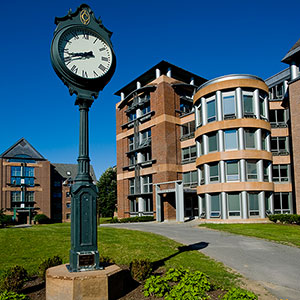
Curtis and Drake Halls will be home to the university’s first residential learning community.
Faculty directors are actively planning, student community leaders are assigned, the housing lottery is underway for current students, and the Class of 2019 is taking shape. That means things are falling into place for this fall, when Colgate will launch the first of four residential learning communities.
The pilot community — accommodating 200 sophomores and 200 first-year students in Curtis and Drake Halls — will be co-led by Rebecca Shiner, professor of psychology, and Mark Shiner, university chaplain.
By 2018 all first- and second-year students — as well as some upper-level students — will live in faculty-led residence halls on campus. Each learning community will be affiliated with an annex on Broad Street, where some sophomore, junior, and senior member-residents will live. Annexes will give each community ideal space for sponsoring social and cultural events, and will keep members connected throughout their four years at Colgate. The first annex will be located at 100 Broad Street.
Colgate’s residential learning community system is a collaboration between the Dean of the College and Dean of the Faculty offices. The Working Group on Living the Liberal Arts developed and proposed the idea in spring 2013 during the planning process for Colgate’s 2014–2019 Strategic Plan, which ultimately was titled Living the Liberal Arts in our Third Century. When asked what words she would use to describe Colgate’s residential learning communities, Suzy Nelson, vice president and dean of the college listed, “welcoming, open, caring, engaging, fun, enriching, supportive, and student-directed.” But she stressed that the much-studied model of students living and learning in one place is also a “high-impact educational practice” that helps students make a smoother transition to college, both academically and socially.
“At Colgate,” Nelson said, “we hope residential learning communities will fundamentally shape students’ lives: by fostering health and wellness, and teaching them that embracing diversity where they live is a way of furthering human understanding.”
As co-leaders, Rebecca and Mark Shiner bring expertise in human development and wellbeing, and a history of creating vibrant co-curricular programs at Colgate, respectively. We have “idealism about the power of living together well,” said Rebecca. Mark, who for his part had the “transformative experience of life in a well-ordered, purpose-driven college residence,” said he hopes to “help new students feel welcome and returning students feel part of something meaningful.”
Douglas Hicks, provost and dean of the faculty said, “Residential learning communities leverage our greatest asset: an educational program built on personalized mentoring relationships. Faculty, as partners with staff and students, will provide direction and purposefulness to the residential experience. A number of first-year seminars will be taught in the residences, where professors will also hold office hours and meet with advisees. This will be a centerpiece in the integrated education that Colgate provides.”
Moving forward, Hicks said, Colgate will replicate and build on this model each year, until all first- and second-year students live in a residential learning community. The second community, to open in fall 2016, will be located in Bryan Hall.
At its April meeting, Colgate’s board of trustees approved funding for the schematic design of a new student residence hall which is expected to be home to the third and fourth learning communities.
Already working to bring the future communities to life are faculty co-directors Antonio Barrera (history and Africana and Latin American studies) and Pilar Meija Barrera (romance languages); Jeff Bary (physics and astronomy) and Mary Simonson (film and media studies and women’s studies); and Frank Frey (biology and environmental studies) and Brenda Frey (researcher in the Office of Institutional Advancement).
While the program is still in its nascent stage, many people have high expectations for the future of residential learning communities at Colgate. Deans Nelson and Hicks hope students will maintain ties to their community as they engage in their many other social and academic activities on campus, and also well beyond their four years at Colgate.
